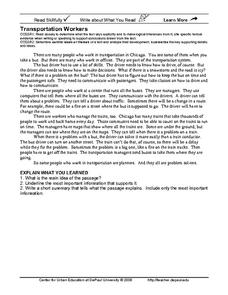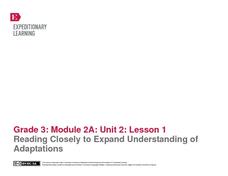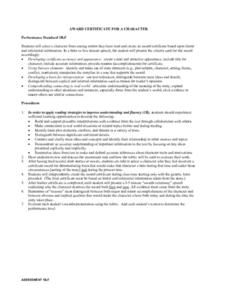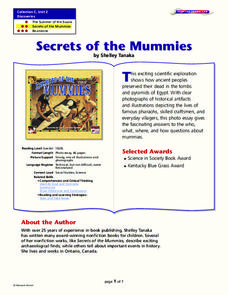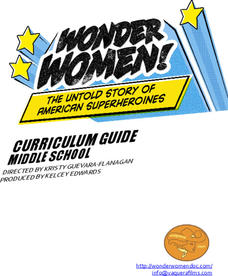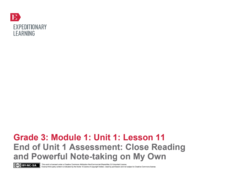Curated OER
Build Masters: Identifying Details
Find key details in books using this note card strategy. Each reader gets six cards with the classic who, what, where, when, why, and how detail prompts. After they read the book, they choose a card and locate a key detail answering the...
Bright Hub Education
Using Evidence and Supporting Details in Writing
In expository writing, it is important to back up claims with evidence and details. Help your class to develop their writing with notes on different types of evidence. Once they have the basics down, practice with a sample thesis and...
Olathe Public Schools
Topic, Main Idea, Supporting Detail, and Theme
Get your class members thinking about a reading passage's topic, main idea, supporting details, and theme with this interactive presentation that asks scholars to define, locate, and review each term.
Curated OER
Life in Old Babylonia: The Importance of Trade
Students read maps and artifacts for information indicating the existence of a trade network in Old Babylonia and beyond. They list goods imported to and exported from Babylonia. They indicate trading centers on a map of ancient...
Do2Learn
Umbrella Organizer Frames
Being able to identify the details that support a main idea is an important skill. Have your pupils practice with this graphic organizer, which includes space for a main idea, three supporting details, and a final conclusion.
EngageNY
Research: Identifying Categories for Our Research About the Wheelwright
Here is a fine lesson plan on reading and understanding expository text designed for 4th graders. With a partner, learners read a passage of text about a machine called a wheelright. This machine was commonly used in the colonial period....
Curated OER
Comprehension: Identify the Main Idea from Text
Children in first grade listen and read along with the teacher to practice main idea identification. They use the provided reading passages to read, locate the main idea and supporting details. This is a fully scripted lesson which means...
Curated OER
Main Idea/Supporting Details Scavenger Hunt
Engage your class in a scavenger hunt to find the main ideas and supporting details in a text. They follow the teacher while s/he models how to determine main idea and find supporting details, and then they work independently. A fun way...
Curated OER
Transportation Workers
Summarizing a text means being able to identify supporting details. Your class can learn about transportation workers in Chicago as they read a one-page informational passage. When they are finished reading they'll explain what they've...
Weebly
Author Study: Eric Carle
Dive into an author study of one of the most beloved children’s book authors, Eric Carle. After reading some of his stories, including Papa Get me the Moon, A House for Hermit Crab, The Grouchy Ladybug, and The Very Busy Spider, readers...
Curated OER
Mapping Out the Story
Discuss the reading comprehension strategy of summarization with your elementary schoolers! They read a chapter from their social studies textbook, Regions Near and Far, and create a map, or word web, for the chapter. They identify...
EngageNY
Close Reading of That Book Woman: How Did People Access Books in Rural Areas of the United States?
For this ninth lesson plan in a larger beginning-of-the-year unit, close reading skills are used independently to find the gist of the story That Book Woman. Rereading for important details is the targeted skill to unlock a deeper...
EngageNY
Reading Closely to Expand Understanding of Adaptations
Third graders work to determine the main idea, recall key details, and answer questions using an informational text on the topic of animal adaptations. Using the non-fiction text "Staying Alive: Animal Adaptations" (provided) the teacher...
Curated OER
Muggie Maggie
Students explore the book Muggie Maggie by Beverly Cleary. In this vocabulary instructional activity, students read to discover multiple meaning words, synonyms, antonyms and identify important details. Students make story predictions...
Curated OER
AWARD CERTIFICATE FOR A CHARACTER
Connect to real-world experiences by having your primary learners create an award certificate based upon literal and inferential information from a story. They present the award to a character from a story and explain the criteria used....
Curated OER
Determining Author's Point of View: The Sneeches
Determine the author's point of view in a text. Young readers read Dr. Seuss' The Sneeches and identify the author's purpose in the story. They identify persuasive techniques in writing, asking and answering questions to better...
Curated OER
Secrets of the Mummies
How did the ancient people of Egypt preserve their dead so well that their bodies are still recognizable today? Learn the painstakingly complex process they used for preservation. Young scholars read and summarize a narrative detailing...
Vaquera Films
Wonder Women - The Untold Story of American Superheroines: Middle School Curriculum Guide
Women in power are the focus of a three-module unit that employs comic books to bring home the importance of equality and proficient media literacy skills. In module one, scholars examine gender roles in media—boosting media literacy and...
Curated OER
Main Idea in Informational Text
Individuals complete a pre-assessment to gauge their ability to determine the main idea and supporting details in nonfiction text. They examine a new piece of nonfiction reading by looking at the table of contents, headings, and index...
EngageNY
Close Reading of Nasreen's Secret School: How Do People Access Books in Afghanistan?
Third graders continue to practice the close reading skills of capturing the gist and reading again for important details in the sixth lesson in a larger unit. This is a great beginning-of-the-year unit for establishing visible thinking...
Curated OER
Determining Importance
Students hone their skills at identifying the principle story in a work of art and text. Through discussion, students assess the central and supporting stories of a work of art that is characterized by multiple layers of action and meaning.
EngageNY
End of Unit 1 Assessment: Close Reading and Powerful Note-Taking on My Own
As the final lesson plan in a larger beginning-of-the-year unit to establish routines and teach close reading skills, this plan is designed as an assessment piece. Using the story, The Librarian of Basra, learners independently complete...
Health Smart Virginia
How Are You Feeling Today?
A presentation guides a thoughtful discussion about identifying emotions. Slide-by-slide, scholars answer questions and offer details about specific feelings. A worksheet challenges class members to draw facial expressions and describe...
DePaul University
Egypt
The country of Egypt is more than just big pyramids and ancient pharaohs. After reading a brief overview of this African nation, young learners will demonstrate their understanding of the text by identifying the main idea and supporting...










